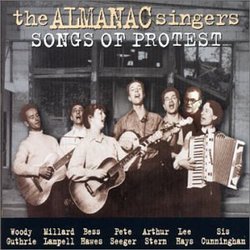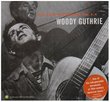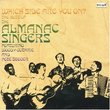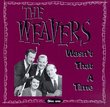| All Artists: Almanac Singers Title: Songs of Protest Members Wishing: 3 Total Copies: 0 Label: Prism Original Release Date: 1/1/2005 Re-Release Date: 10/25/2005 Album Type: Import Genre: Folk Style: Traditional Folk Number of Discs: 1 SwapaCD Credits: 1 |
Search - Almanac Singers :: Songs of Protest
 | Almanac Singers Songs of Protest Genre: Folk
|
Larger Image |
CD DetailsSimilar CDs
|
CD ReviewsWasn't that a time? William E. Adams | Midland, Texas USA | 06/25/2002 (5 out of 5 stars) "Although I would date the modern recorded folksong movement from Woody Guthrie's "Dust Bowl Ballads", done in 1940, there is no doubt that the 1941 and early '42 performances of The Almanac Singers are precious historical gems. The group performed for a little more than a year, and had four recording sessions between April of '41 and February of '42. At the sessions, fewer than 35 songs were cut, and 29 of them are on this one bargain-priced and good-sounding disc. Actually, 11 different musicians performed either in person or on record as "Almanacs" ranging from solos to seven at a time. The most famous turned out to be Woody, who joined late, and Pete Seeger, there from the first, and Lee Hays, who later became a vital part of "The Weavers." Among the others were Josh White, Millard Lampell, Pete and Bess Hawes, and Sis Cunningham. The strength and the fatal flaw in the group was the same thing: identification with the American Communist Party at the end of the depression and just before the U.S. joined World War II. The generally shared leftist view allowed the Almanacs to write, arrange and perform the greatest pro-labor union songs we've ever had, during a time when forming or joining a union was an act of bravery. Five of those dated treasures are included here, including Woody's "Union Maid" and "I Don't Want Your Millions, Mister" (here titled "All I Want".) Also included is Woody's classic "Sinking of the Reuben James" with the lead vocal done by the young Pete Seeger, only a few months after the ship went down in the North Atlantic. Oddly, the most dated songs, a half-dozen which protested any thought of America joining the war (because in the weeks of their creation the Soviet Union and Germany had a friendship pact) are pretty much the most powerful pieces on here. Listening, one can find the seeds of the anti-Vietnam music which was nearly 25 years in the future. The Almanacs got caught in a bind caused by political naivete and youthful excess, because shortly after they recorded an album full of these kinds of tunes, the Hitler-Stalin treaty went bust, and all of a sudden it was OK to consider going to war. The final recording session, in early '42, after Pearl Harbor, is represented by four songs here, including two versions of "Round and Round Hitler's Grave." The disc starts out with traditional songs of farming, ranching, and going to sea, and while the Almanacs' performances are fine, there is a noticeable lack of passion when compared to the political songs which follow. Since Pete Seeger does lead vocals on 19 of these 29 items, any Pete fan needs to have this in his collection. He is so young here, he does not always sound like the more familiar and beloved Pete of the Civil Rights era. Same with Lee Hays, so young that he has not quite developed that magnificent deep sound that for my dough, was the soul of the Weavers, a group which came into its own nearly a decade later. If you like songs of the Depression, songs for or against WWII, leftist propaganda songs, pro-union numbers, or songs of the sea and soil, early Pete or early Woody, you should own this. For this price, it is priceless. You may not play it constantly, but when you do play it, it will take you back to an earlier but still troubled America, and to a group of good souls who played music more for love than money."
|

 Track Listings (29) - Disc #1
Track Listings (29) - Disc #1


